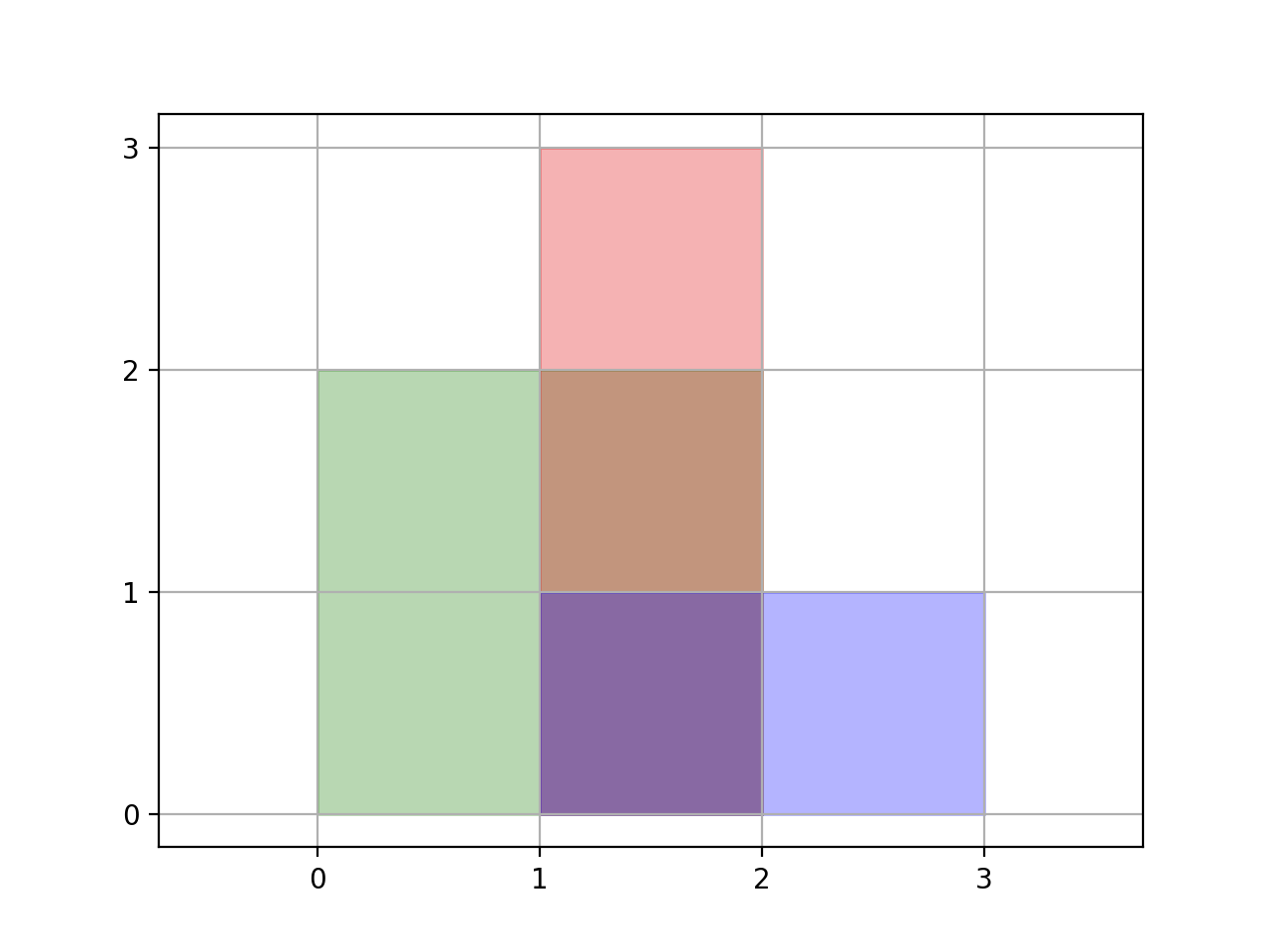2021-05-31 Daily-Challenge
Today I have done Rectangle Area II and leetcode's May LeetCoding Challenge with cpp.
Rectangle Area II
Description
We are given a list of (axis-aligned) rectangles. Each rectangle[i] = [xi1, yi1, xi2, yi2] , where (xi1, yi1) are the coordinates of the bottom-left corner, and (xi2, yi2) are the coordinates of the top-right corner of the ith rectangle.
Find the total area covered by all rectangles in the plane. Since the answer may be too large, return it modulo 109 + 7.
Example 1:

Input: rectangles = [[0,0,2,2],[1,0,2,3],[1,0,3,1]]
Output: 6
Explanation: As illustrated in the picture.
Example 2:
Input: rectangles = [[0,0,1000000000,1000000000]]
Output: 49
Explanation: The answer is 1018 modulo (109 + 7), which is (109)2 = (-7)2 = 49.
Constraints:
1 <= rectangles.length <= 200rectanges[i].length = 40 <= rectangles[i][j] <= 109- The total area covered by all rectangles will never exceed
263 - 1and thus will fit in a 64-bit signed integer.
Solution
sweeping line + segment tree, I need review it.
struct Node {
int l, r, y, v;
bool operator<(const Node& a) const {
return this->y < a.y;
}
};
Node segTree[400];
int sum[1600];
int lazy[1600];
int mp[200];
int mappingLen;
int id(int x) {
return lower_bound(mp, mp + mappingLen, x) - mp;
}
int query() {
return sum[0];
}
void pull(int l, int r, int o) {
// cout << "P " << mp[l] << ' ' << mp[r] << endl;
if(lazy[o] > 0) sum[o] = mp[r + 1] - mp[l];
else sum[o] = sum[o * 2 + 1] + sum[o * 2 + 2];
}
void update(int l, int r, int ql, int qr, int v, int o = 0) {
if(ql <= l && r <= qr) {
lazy[o] += v;
} else {
// cout << l << ' ' << r << ' ' << ql << ' ' << qr << endl;
int mid = (l + r) >> 1;
if(ql <= mid) update(l, mid, ql, qr, v, o * 2 + 1);
if(qr > mid) update(mid + 1, r, ql, qr, v, o * 2 + 2);
}
// cout << "#" << o << ' ' << lazy[o] << ' ';
pull(l, r, o);
// cout <<"#" << o << ' '<< sum[o] << endl;
}
const int MOD = 1e9 + 7;
class Solution {
int n;
long long prevY;
void init(vector<vector<int>>& rectangles) {
n = rectangles.size();
for(int i = 0; i < n ; ++i) {
segTree[i * 2].l = rectangles[i][0];
segTree[i * 2].r = rectangles[i][2];
segTree[i * 2].y = rectangles[i][1];
segTree[i * 2].v = 1;
segTree[i * 2 + 1].l = rectangles[i][0];
segTree[i * 2 + 1].r = rectangles[i][2];
segTree[i * 2 + 1].y = rectangles[i][3];
segTree[i * 2 + 1].v = -1;
mp[i * 2] = rectangles[i][0];
mp[i * 2 + 1] = rectangles[i][2];
}
sort(segTree, segTree + n * 2);
sort(mp, mp + n * 2);
mappingLen = unique(mp, mp + n * 2) - mp;
for(int i = 0; i < 2 * n; ++i) {
segTree[i].l = id(segTree[i].l);
segTree[i].r = id(segTree[i].r);
}
prevY = segTree[0].y;
}
int solve() {
long long answer = 0;
// cout << mappingLen << endl;
for(int i = 0; i < n * 2; ++i) {
// cout << sum[0] << ' ' << prevY << ' ' << segTree[i].y << endl;
// cout << mp[segTree[i].l] << ' '<< mp[segTree[i].r] << ' ' << segTree[i].v <<endl;
answer += query() * (segTree[i].y - prevY);
update(0, mappingLen - 1, segTree[i].l, segTree[i].r - 1, segTree[i].v);
prevY = segTree[i].y;
}
answer %= MOD;
return answer;
}
public:
int rectangleArea(vector<vector<int>>& rectangles) {
init(rectangles);
return solve();
}
};
// Accepted
// 78/78 cases passed (0 ms)
// Your runtime beats 100 % of cpp submissions
// Your memory usage beats 99.37 % of cpp submissions (8.4 MB)
May LeetCoding Challenge 31
Description
Search Suggestions System
Given an array of strings products and a string searchWord. We want to design a system that suggests at most three product names from products after each character of searchWord is typed. Suggested products should have common prefix with the searchWord. If there are more than three products with a common prefix return the three lexicographically minimums products.
Return list of lists of the suggested products after each character of searchWord is typed.
Example 1:
Input: products = ["mobile","mouse","moneypot","monitor","mousepad"], searchWord = "mouse"
Output: [
["mobile","moneypot","monitor"],
["mobile","moneypot","monitor"],
["mouse","mousepad"],
["mouse","mousepad"],
["mouse","mousepad"]
]
Explanation: products sorted lexicographically = ["mobile","moneypot","monitor","mouse","mousepad"]
After typing m and mo all products match and we show user ["mobile","moneypot","monitor"]
After typing mou, mous and mouse the system suggests ["mouse","mousepad"]
Example 2:
Input: products = ["havana"], searchWord = "havana"
Output: [["havana"],["havana"],["havana"],["havana"],["havana"],["havana"]]
Example 3:
Input: products = ["bags","baggage","banner","box","cloths"], searchWord = "bags"
Output: [["baggage","bags","banner"],["baggage","bags","banner"],["baggage","bags"],["bags"]]
Example 4:
Input: products = ["havana"], searchWord = "tatiana"
Output: [[],[],[],[],[],[],[]]
Constraints:
1 <= products.length <= 1000- There are no repeated elements in
products. 1 <= Σ products[i].length <= 2 * 10^4- All characters of
products[i]are lower-case English letters. 1 <= searchWord.length <= 1000- All characters of
searchWordare lower-case English letters.
Solution
already done before
auto speedup = []() {
std::ios::sync_with_stdio(false);
cin.tie(nullptr);
cout.tie(nullptr);
return nullptr;
}();
class Solution {
public:
vector<vector<string>> suggestedProducts(vector<string>& products, string searchWord) {
sort(products.begin(), products.end());
vector<vector<string>> answer;
auto begin = products.begin();
auto end = products.end();
for(int i = 0; i < searchWord.length(); ++i) {
auto cmp = [=](string a, string b) {
return a[i] < b[i];
};
auto newBegin = lower_bound(begin, end, searchWord, cmp);
auto newEnd = upper_bound(begin, end, searchWord, cmp);
begin = newBegin;
end = newEnd;
if(newEnd - newBegin > 3) newEnd = newBegin + 3;
if(newEnd - newBegin <= 0) break;
answer.push_back(vector<string>(newBegin, newEnd));
}
while(answer.size() < searchWord.length()) answer.push_back({});
return answer;
}
};